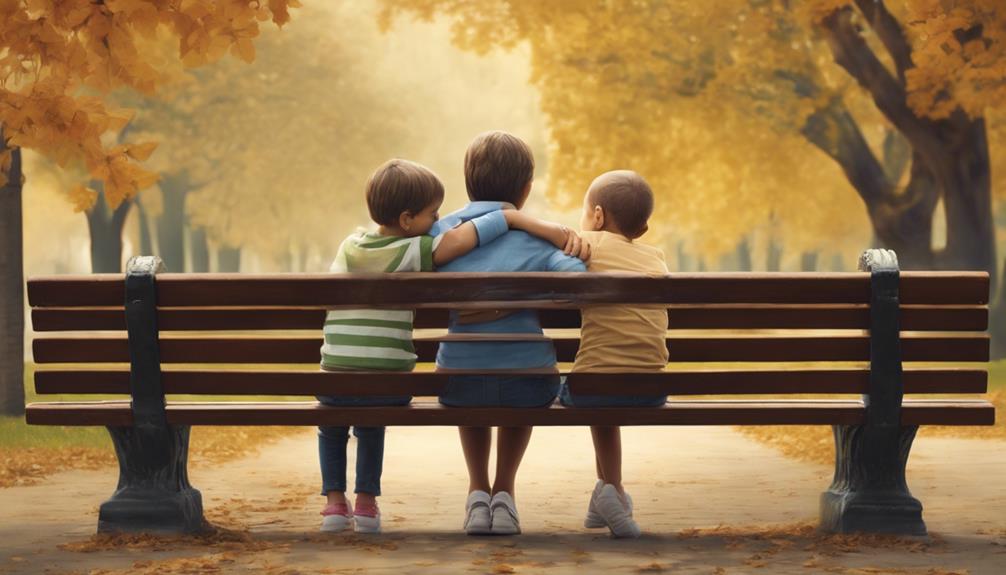Coping Strategies
Helping Children Find Emotional Support After Divorce and Separation
Paving a path towards healing and resilience, discover effective strategies for assisting children in coping with the emotional aftermath of divorce and separation.

Helping children manage their feelings post-divorce is like steering them through a stormy sea, where darkness seems to hide the clear path ahead.
The journey of helping children find solace and understanding post-separation can be complex, but with the right tools and support, it is a path that can lead to healing and resilience.
Let's explore effective strategies that can assist children in coping with the emotional aftermath of divorce and separation, ensuring their well-being is prioritized through this challenging time.
Key Takeaways
- Acknowledge and address children's complex emotions post-divorce for their well-being.
- Establish open communication channels to support children's emotional needs effectively.
- Encourage healthy coping mechanisms and provide reassurance to help children cope.
- Seek professional guidance and therapy to empower children in navigating emotional challenges post-divorce.
Understanding Children's Emotional Needs
Understanding the emotional needs of children going through divorce is essential for providing them with the support and guidance they require during this challenging time. Children of divorce often grapple with a range of complex emotions such as sadness, confusion, fear, guilt, and grief.
They may worry about their future well-being and the shifting dynamics within their families. As parents, it's crucial to acknowledge and address these emotional needs to help children navigate feelings of loss and uncertainty post-divorce.
Without adequate support, kids may experience negative consequences like decreased academic performance and compromised physical health. It's important to remember that the impact of divorce on children can extend into their future well-being, influencing factors such as socioeconomic status and even their likelihood of experiencing divorce themselves.
Building a Supportive Environment

Creating a supportive environment for children post-divorce involves fostering open communication and encouraging them to express their emotions freely. It's crucial to provide reassurance and physical closeness to help children feel secure and loved during this time of transition. Establishing predictable routines and consistent rules can create much-needed stability for children, offering them a sense of normalcy amidst the changes happening in their family life.
Additionally, listening attentively to children's concerns and addressing them honestly is key to promoting their emotional well-being and helping them navigate through this challenging period. Here are five essential ways to build a supportive environment for children:
- Maintain open communication channels with your child.
- Encourage your child to talk about their feelings and emotions.
- Establish predictable routines and consistent rules at home.
- Provide reassurance, physical closeness, and quality family time.
- Listen attentively to your child's concerns and address them honestly.
Communicating Openly and Honestly
As we navigate the aftermath of divorce, fostering open and honest communication with our children is crucial for helping them process their emotions and adapt to the changes in our family dynamic. Make sure to talk to your children about their feelings and concerns, creating a safe space for them to express difficult emotions. Let kids know that it's okay to feel upset, confused, or even relieved, and reassure them that their well-being is a top priority. By providing age-appropriate explanations, you can help your children understand the situation better and reduce any confusion they may be experiencing.
Support from others can also play a significant role in helping children cope with the changes. Encourage dialogue not only within the family but also with trusted friends, family members, or a therapist if needed. This support network can help children feel heard, validated, and supported as they navigate this challenging time. Remember, resilience in children often stems from their ability to remain open and honest about their feelings, so continue to prioritize communication that meets your children's needs.
Encouraging Healthy Coping Mechanisms

Encouraging children to explore and utilize healthy coping mechanisms is essential in supporting their emotional well-being following a divorce or separation. Children cope with separation more effectively when provided with the right tools and guidance.
Here are five strategies to help children navigate this challenging time:
- Teaching coping strategies: Introduce techniques like deep breathing or journaling to help children manage stress and process their emotions.
- Engaging in enjoyable activities: Encourage participation in sports, art, or hobbies to boost mood and self-esteem during the adjustment period.
- Seeking emotional expression: Support children in expressing their feelings through creative outlets or conversations to promote emotional release.
- Creating a supportive environment: Foster open communication and active listening to ensure children feel heard and understood after the divorce or separation.
- Providing emotional support: Offer reassurance, love, and understanding to help children feel secure and navigate this period of change with greater ease.
Seeking Professional Guidance and Support
Navigating the emotional complexities that children experience post-divorce can be significantly aided by seeking professional guidance and support. When children face emotional challenges due to divorce, turning to mental health professionals, such as therapists or counselors, can provide invaluable coping strategies. These professionals are equipped to help children process their complex emotions in a safe space, allowing them to express their feelings and concerns freely.
Through therapeutic interventions, children can gradually build resilience and adapt positively to the changes brought about by divorce. Seeking professional guidance not only supports children in managing their emotions but also empowers them to develop effective strategies for handling the challenges they encounter. By engaging with mental health professionals, children can find the necessary tools to navigate the turbulent waters of divorce and emerge stronger and more emotionally resilient.
Frequently Asked Questions
How Can I Help My Child Cope With Separation and Divorce?
We can help our child cope with separation and divorce by creating a safe space for open communication, reassuring them it's not their fault, maintaining routines, listening actively, and seeking professional help if needed for emotional support.
How Can Separation and Divorce Affect a Child Emotionally?
Separation and divorce can deeply impact a child emotionally, leading to feelings of sadness, confusion, fear, and worry about their future well-being. These changes can result in decreased academic performance and compromised physical health.
What's the Hardest Age for Children to See Their Parents Split?
Certainly! The tween years, around ages 9 to 12, can be the toughest for kids witnessing parental separation. Their cognitive development and heightened awareness of family dynamics intensify feelings of betrayal and confusion, making the process emotionally challenging.
What Is the Best Therapy for Children of Divorce?
We believe play therapy, CBT, family therapy, art therapy, and group therapy are all valuable options for children of divorce. Each offers a unique approach to help kids process emotions, challenge negative thoughts, improve communication, and find support in their peers.
Conclusion
In the end, it's absolutely crucial to remember that helping children find emotional support after divorce and separation is like giving them a lifeline in a stormy sea.
By providing a safe harbor of love, understanding, and guidance, we can help them navigate the turbulent waters of change with strength and resilience.
Let's be their anchors, their guiding lights, and their unwavering support as they brave the journey ahead.
Together, we can empower them to weather any storm.
Maya brings a wealth of experience in providing emotional support to individuals facing life’s challenges. Her contributions to How Get Divorce are characterized by empathy, understanding, and a profound sense of authority on matters of emotional well-being. Maya’s work is dedicated to ensuring that our community feels supported and understood, offering tools and advice to cope with the emotional aspects of divorce.
Coping Strategies
5 Ways Adult Children Can Cope With Parents' Divorce
Wade through the complexities of navigating your parents' divorce with these five essential coping strategies, and discover how to find stability amidst the storm.

We all know that navigating our parents' divorce can feel like trying to sail through stormy waters without a compass. The choppy emotions and uncertainty can leave us feeling adrift.
However, there are ways to anchor ourselves amidst the turmoil. By setting clear boundaries, seeking professional support, maintaining open communication, finding healthy outlets for stress, and building a strong support network, we can weather this challenging time with resilience and grace.
Let's explore these strategies together and discover how they can help us navigate the storm of our parents' divorce.
Key Takeaways
- Establish emotional boundaries with parents to protect mental well-being.
- Seek therapy for processing emotions and developing coping strategies.
- Maintain open communication with parents to express needs and set boundaries.
- Find personal outlets for stress through activities like exercise and journaling.
Establishing Emotional Boundaries
Establishing emotional boundaries during your parents' divorce is crucial for maintaining your mental well-being and navigating your own feelings effectively. As adult children, it's essential to communicate assertively with your parents about what you can handle emotionally. By setting healthy boundaries, you can protect yourself from being overwhelmed by the details of their divorce. It's okay to express your needs clearly and respectfully, ensuring that you prioritize your mental well-being throughout this challenging time.
When you create emotional boundaries, you give yourself the space to process your own emotions separate from your parents' situation. This allows you to navigate your feelings in a way that's healthy and constructive, without feeling burdened by their divorce. By being assertive about what you can handle and how you wish to be involved, you maintain a sense of autonomy and control over your emotional well-being. Remember, it's important to take care of yourself while supporting your parents through this process.
Seeking Therapy for Support

Therapy offers a safe and supportive environment for adult children to process their emotions and navigate the complexities of their parents' divorce. Seeking therapy can provide a vital outlet for expressing feelings and learning coping strategies to address the emotional challenges that arise.
Professional therapists offer guidance on processing the impact of the divorce, helping adult children develop healthy ways to deal with these effects. Through therapy, individuals can work on establishing boundaries, understanding their emotions, and improving communication post-divorce.
Engaging in therapy sessions can support adult children in building resilience and moving forward positively despite the challenges they face. It's essential to remember that seeking therapy is a proactive step towards healing and growth, offering valuable tools and insights to navigate the aftermath of parental divorce with strength and grace.
Communicating Openly With Parents
When navigating communication with parents post-divorce, fostering open dialogue can be key to expressing emotions and maintaining a healthy relationship. It's essential to communicate openly with our parents while setting boundaries to ensure that our needs are respected. By discussing our concerns calmly and without judgment, we can foster understanding and support within our family unit. Seeking help from friends, family, or professionals when facing communication challenges can provide valuable assistance during this transition. Remember, prioritizing self-care and mental well-being is crucial in these conversations to navigate the challenges that come with parental divorce. Below is a table summarizing key points to consider when communicating with parents post-divorce:
| Key Points |
|---|
| Express feelings openly |
| Set healthy boundaries |
| Seek support |
| Prioritize self-care |
| Communicate calmly |
Finding Personal Outlets for Stress

Navigating the emotions stemming from our parents' divorce can be overwhelming, but finding personal outlets for stress is crucial in maintaining our mental well-being and resilience. When faced with the emotional strain of our parents' divorce, it's essential to prioritize self-care and explore various avenues to alleviate stress. Here are some ways to find personal outlets for stress:
- Engage in stress-relieving activities: Incorporating exercise, meditation, or hobbies into our routine can help manage the emotional turmoil caused by the divorce.
- Seek support: Whether it's from friends, family, or a therapist, reaching out to others can provide a safe space to express our feelings and gain valuable perspectives.
- Journal your thoughts: Writing down our thoughts and emotions can serve as a therapeutic outlet for processing the impact of the divorce and fostering self-reflection.
- Participate in support groups: Connecting with other adult children of divorce in support groups can offer a sense of community and understanding during this challenging time.
Building a Support Network
To establish a strong foundation for coping with parental divorce, building a supportive network of understanding friends and family members is paramount.
When navigating the complexities of our emotions during this challenging time, seeking guidance from a therapist or counselor can provide a safe and non-judgmental space to process our feelings and gain professional support.
Additionally, joining support groups specifically designed for adult children of divorce can offer a sense of community and shared experiences, reminding us that we aren't alone in our journey.
Engaging in self-care activities such as exercise, meditation, or pursuing hobbies can also play a crucial role in promoting emotional well-being and reducing stress levels.
Frequently Asked Questions
How Do Adults Cope With Parents Divorcing?
We cope with parents divorcing by maintaining open communication, setting boundaries, seeking support, addressing concerns calmly, and prioritizing self-care. It's crucial to navigate this challenging time with understanding and care for ourselves.
How Can Adults Help Children Cope With Divorce?
We can support children coping with divorce by encouraging open dialogue, providing love and stability, seeking professional help if needed, maintaining routines, and shielding them from parental conflicts. Our role is crucial in helping them navigate this challenging time.
How Do You Cope With Divorce When You Still Love Him?
When we still love amidst separation, we honor our feelings and seek support to navigate the complex emotions. By setting boundaries, focusing on self-care, and embracing growth, we move forward with grace and resilience.
How Can I Help My Grown Daughter Through Her Divorce?
We can provide emotional support and encourage open communication with our grown daughter during her divorce. By helping her set boundaries, seek professional help if needed, and create a supportive network, we can assist her through this challenging time.
Conclusion
As adult children navigating our parents' divorce, it's important to remember that we aren't alone in this journey. One statistic that may surprise you is that over 1 million children experience their parents' divorce each year.
Let's continue to prioritize our mental well-being, seek support when needed, and remember that it's okay to lean on others during this challenging time. Together, we can navigate this difficult transition with strength and resilience.
Maya brings a wealth of experience in providing emotional support to individuals facing life’s challenges. Her contributions to How Get Divorce are characterized by empathy, understanding, and a profound sense of authority on matters of emotional well-being. Maya’s work is dedicated to ensuring that our community feels supported and understood, offering tools and advice to cope with the emotional aspects of divorce.
Coping Strategies
Coping With Loneliness After Divorce: a Step-By-Step Guide
Kicking off a transformative journey through loneliness after divorce, discover practical steps and self-discovery strategies that lead to healing and a new chapter in life.

Navigating the sea of loneliness post-divorce can feel like being adrift without a compass in uncharted waters.
However, with practical steps and a supportive approach, finding solace and rediscovering oneself is within reach.
As we explore the depths of coping mechanisms and self-discovery in the aftermath of divorce, let's uncover the transformative journey towards healing and embracing a new chapter of life.
Key Takeaways
- Acknowledge and process negative emotions without judgment for healing.
- Engage in social activities to build new connections and combat loneliness.
- Practice self-care and seek professional help for emotional well-being.
- Explore new interests and hobbies to rediscover identity and boost mood.
Understanding Post-Divorce Loneliness
In understanding post-divorce loneliness, it's important to recognize that this emotional experience can vary greatly among individuals. The impact of divorce on our emotional state is profound, and feelings of loneliness can be intensified by emotional abandonment experienced during the marriage.
Coping with post-divorce loneliness involves acknowledging and processing negative emotions without self-judgment. It's normal to feel a range of emotions during this time, and it's crucial to lean on a support system that includes friends and family. Building emotional resilience is key to navigating the challenges of post-divorce loneliness.
While the journey may feel isolating, remember that you aren't alone in this experience. By engaging in healthy coping strategies and surrounding yourself with a supportive network, you can begin to heal from the pain of divorce and gradually rediscover a sense of connection and belonging.
Building Social Connections

Let's strengthen our social connections after divorce by actively engaging in supportive communities and activities. Loneliness can feel overwhelming, but there are ways to combat it. Here are some practical steps to help you build social connections and find companionship during this challenging time:
- Joining Support Groups: Connecting with others who understand your feelings can provide immense comfort and validation.
- Engaging in Social Activities: Participating in events and activities can help you meet new people and form meaningful connections.
- Reconnecting with Old Friends and Family: Reaching out to trusted friends and family members can offer a sense of familiarity and support.
- Volunteering in Community Organizations: Giving back to the community not only reduces loneliness but also gives you a sense of purpose and fulfillment.
- Participating in Online Communities: Engaging in virtual support groups can provide valuable insights, advice, and a sense of belonging in a digital space.
Coping Strategies and Self-Care
Strengthening our coping strategies and prioritizing self-care are crucial steps in navigating the emotional challenges that come with loneliness after divorce. Engaging in self-care practices such as meditation, exercise, or journaling can nurture our emotional well-being, providing a sense of comfort during difficult times. Building a strong support system with friends, family, or support groups is essential in combating feelings of loneliness. Seeking professional help or therapy is a proactive step if these feelings become overwhelming or persistent.
Taking up new hobbies or activities can be a great way to distract ourselves, meet new people, and foster a sense of connection. By practicing gratitude daily and focusing on the positives in our lives, we can promote emotional resilience and well-being. Remember, it's okay to prioritize self-care and seek help when needed; these actions are vital in the journey towards healing and finding peace after a divorce.
Exploring New Interests and Hobbies

Exploring new interests and hobbies post-divorce can open doors to exciting opportunities for personal growth and fulfillment. It's a chance to shift your focus from the past to the present, embracing activities that bring joy and a sense of purpose. Here are some ways diving into new hobbies can benefit you:
- Find Fulfillment: Engaging in activities that you enjoy can provide a sense of fulfillment and accomplishment.
- Boost Your Mood: Trying new things can boost your mood and overall well-being, helping you navigate through challenging times.
- Create a Fresh Identity: Discovering new interests allows you to create a fresh identity and explore different aspects of yourself beyond your past relationship.
- Expand Your Social Circle: Exploring new hobbies can introduce you to like-minded individuals, expanding your social circle and providing a sense of community.
- Explore Yourself: Trying out new interests is a great way to explore different facets of your personality and interests, leading to personal growth and self-discovery.
Seeking Support and Community
Navigating the challenges of loneliness after a divorce can be eased by actively seeking out support and community resources. Joining a support group can provide a sense of belonging and understanding from individuals who are going through similar experiences. Additionally, seeking therapy or counseling post-divorce can offer professional guidance in coping with loneliness, helping you navigate your emotions more effectively.
Engaging in social activities and events is another effective way to combat feelings of isolation and build new connections. Building a strong support system with friends and family members can offer valuable emotional support and companionship during tough times. Participating in volunteer work or community service can also provide a sense of purpose and connection to others, reducing feelings of loneliness by allowing you to contribute positively to society.
Frequently Asked Questions
How Can I Manage Feelings of Guilt or Shame After My Divorce?
We manage feelings of guilt or shame after divorce by acknowledging our emotions, seeking support from loved ones or therapy, and focusing on self-compassion and growth. It's okay to feel this way; we're not alone.
Is It Common to Experience a Sense of Loss Over the End of My Marriage, Even if I Initiated the Divorce?
Absolutely, it's entirely normal to feel a sense of sorrow or separation after divorce, even if you initiated it. We, too, experienced this. Processing these emotions with care and support is crucial for healing.
What Are Some Ways to Navigate Awkward Social Situations or Interactions With Mutual Friends Post-Divorce?
Navigating awkward social situations post-divorce can be tough. We find that honesty, setting boundaries, and focusing on our well-being help. It's about being true to ourselves and surrounding ourselves with understanding friends.
How Can I Address Any Negative Self-Talk or Beliefs About Myself That May Have Developed During or After the Divorce?
Feeling down about ourselves post-divorce is common. We've been there. It's crucial to challenge those negative beliefs. Treat yourself as a dear friend, offering love and encouragement. Embrace your worth; you deserve it.
Are There Any Specific Resources or Support Groups Tailored to Individuals Going Through a Divorce Who Are Also Dealing With Loneliness?
Of course, there are tailored resources and support groups to help individuals navigating divorce and loneliness. These can provide comfort, understanding, and practical advice. Connecting with others in similar situations can make a significant difference in your journey.
Conclusion
As we navigate the challenging waters of post-divorce loneliness, let's remember that this feeling is temporary. By prioritizing self-care, building social connections, exploring new hobbies, and seeking support, we can gradually find our way to a fulfilling and happy life beyond divorce.
Remember, the journey may be tough, but with perseverance and support, we can emerge stronger and more resilient than ever before. Trust in the process and believe in your ability to overcome this obstacle.
Maya brings a wealth of experience in providing emotional support to individuals facing life’s challenges. Her contributions to How Get Divorce are characterized by empathy, understanding, and a profound sense of authority on matters of emotional well-being. Maya’s work is dedicated to ensuring that our community feels supported and understood, offering tools and advice to cope with the emotional aspects of divorce.
Coping Strategies
7 Ways Men Can Cope With Divorce
Journey through seven essential strategies for men to navigate the challenges of divorce and emerge stronger than ever.

As we journey through the turbulent seas of divorce, we frequently search for methods to stabilize our emotional health in the midst of chaos.
However, with careful consideration and strategic planning, there are seven key strategies that can help men not only survive but thrive post-divorce.
From redefining personal goals to fostering a strong support system, these coping mechanisms offer a roadmap to healing and growth in the aftermath of a significant life transition.
Key Takeaways
- Embrace change as a path to personal growth.
- Build a strong support system for emotional stability.
- Prioritize self-care and well-being during the transition.
- Seek professional counseling for guidance and coping strategies.
Acceptance and Embracing Change
Embracing the reality of divorce and welcoming change is a crucial step for us men to begin our journey towards healing and moving forward. Acceptance is the first key to unlocking the door to personal growth post-divorce. It's about acknowledging the situation for what it is, not what we hoped it would be.
By embracing change, we allow ourselves the opportunity to redefine who we're and what we want out of life. This can be a chance for us to shed old layers and embrace new beginnings.
During this healing process, uncertainties and emotional challenges may arise. It's important to remember that change is inevitable post-divorce. By understanding this, we can navigate the emotional rollercoaster with more grace and resilience.
Letting go of the past doesn't mean forgetting it; it means accepting it and choosing to move forward. Embracing new beginnings isn't always easy, but it's a necessary step towards finding peace and happiness once again.
Building a Strong Support System

Establishing a strong support system is crucial for men navigating the challenges of divorce, providing a foundation of stability and comfort during this difficult period. When coping with the emotional turmoil of divorce, having a network of supportive individuals can make a significant difference in how we navigate this challenging time.
Here are four ways to build a strong support system:
- Lean on Friends and Family: Reach out to trusted friends and family members who can lend a listening ear and offer support during this challenging period.
- Consider Therapy or Support Groups: Joining therapy sessions or support groups can provide a safe space to express your feelings and gain insights from others going through similar experiences.
- Seek Professional Help: Consulting with therapists or counselors can equip you with valuable coping mechanisms to navigate the complexities of divorce.
- Build Trustworthy Connections: Cultivate relationships with individuals you trust, creating a support network that helps combat feelings of isolation and empowers you to face the challenges ahead.
Prioritizing Self-Care and Well-Being
As we focus on prioritizing self-care and well-being after divorce, it's essential to recognize the value of nurturing our mental and physical health during this challenging time. Engaging in self-care activities like exercise, mindfulness, and healthy eating can significantly improve our overall well-being. By taking care of ourselves, we can better cope with the emotional stress of divorce and rebuild our confidence and sense of identity.
Let's explore some practical ways to prioritize self-care and well-being:
| Self-Care Activities | Benefits | Tips for Implementation |
|---|---|---|
| Benefits of Professional Help | ||
| Reduces risk of mental health issues like depression and anxiety | ||
| Tailored coping strategies for individual needs | ||
| Safe space to express emotions and work towards healing | ||
Engaging in therapy is a proactive approach towards enhancing mental well-being and personal growth during the divorce journey. Remember, seeking help is a sign of strength and self-care.
Building a Support System
To navigate the challenges of divorce effectively, men can start by actively building a support system that promotes positive coping mechanisms and emotional stability. It's crucial to surround yourself with understanding individuals who can offer encouragement and guidance during this difficult time. Here are four ways to cultivate a strong support system:
- Engage with friends, family, or support groups: Create a safe space to share your feelings and experiences.
- Seek professional therapy or counseling: Process your emotions and navigate divorce challenges effectively.
- Participate in physical activities or hobbies: Healthy outlets for stress can promote mental well-being.
- Create a support network: Receive the encouragement and understanding needed for successful divorce recovery.
Focusing on Future Growth and Healing

As we navigate through the challenges of divorce, focusing on future growth and healing becomes a crucial aspect of our journey towards a brighter tomorrow. It's essential to embrace personal growth by redefining ourselves through new habits and cultivating positive outlooks. Breaking free from old patterns facilitates healing and helps us move forward in life post-divorce. Engaging in classes and social groups allows us to step out of our comfort zones, embracing change and new experiences as part of our healing process. Taking proactive steps towards personal growth is key to transitioning positively after divorce.
| Future Growth and Healing | Practical Tips |
|---|---|
| Embrace Personal Growth | Redefine yourself through new habits and positive outlooks. |
| Moving Forward Post-Divorce | Break free from old patterns to facilitate healing and progress. |
| Embracing Change | Engage in classes and social groups to step out of your comfort zone. |
| Healing Process | Take proactive steps towards personal growth and transitioning post-divorce. |
Frequently Asked Questions
How Does a Man Cope With Divorce?
We understand how overwhelming divorce can feel. Seeking therapy, staying active, building a support network, prioritizing self-care, and focusing on healthy co-parenting are essential. Remember, you're not alone, and we're here to help.
What Divorce Does to a Man Emotionally?
Divorce can leave us feeling emotionally shattered. It triggers a whirlwind of fear, anxiety, and depression. We struggle with vulnerability and the weight of drained spirits. Coping with these deep wounds takes time and support.
Why Is Divorce so Hard on Men?
Divorce hits us hard as we navigate through loss, shattered dreams, and identity crises. Coping with the emotional turmoil, societal pressures, and uncertainties, we struggle to find our footing amidst the storm.
How Do You Cope With Divorce When You Still Love Him?
We cope with divorce when we still love him by prioritizing our emotional well-being, seeking therapy for clarity, focusing on self-care, setting boundaries, and allowing ourselves to grieve while working towards healing and acceptance.
Conclusion
As we navigate through the challenging journey of divorce, let's remember that healing takes time and patience.
By embracing change, building a strong support system, and prioritizing self-care, we can gradually find peace and growth.
Let's continue to focus on our well-being and future, knowing that each step we take brings us closer to a brighter tomorrow.
Stay strong, stay hopeful, and remember that better days are ahead.
Maya brings a wealth of experience in providing emotional support to individuals facing life’s challenges. Her contributions to How Get Divorce are characterized by empathy, understanding, and a profound sense of authority on matters of emotional well-being. Maya’s work is dedicated to ensuring that our community feels supported and understood, offering tools and advice to cope with the emotional aspects of divorce.
-

 Navigating the Divorce Process2 months ago
Navigating the Divorce Process2 months agoNavigating the Complexity: Divorce Document Preparation Services Explained
-

 Life After Divorce2 months ago
Life After Divorce2 months agoTD Jakes: Life After Divorce – A Journey of Healing
-

 Financial Aspects2 months ago
Financial Aspects2 months agoFinancial Advisor's Guide to Navigating Divorce Finances
-

 Supporting Children Through Divorce2 months ago
Supporting Children Through Divorce2 months agoPositive Effects of Divorce on Children: A Guide to Understanding
-

 Navigating the Divorce Process2 months ago
Navigating the Divorce Process2 months agoDivorce Lawyers New Orleans: Your Ultimate Guide to Legal Separation and Family Law
-

 Navigating the Divorce Process2 months ago
Navigating the Divorce Process2 months agoNavigating Divorce with a Muslim Divorce Lawyer
-

 Directory2 months ago
Directory2 months agoCompassionate Vista Divorce Attorney | Family Law Help
-

 Navigating the Divorce Process2 months ago
Navigating the Divorce Process2 months agoUnderstanding Dominican Republic Divorce Law







































